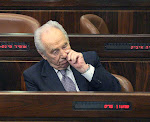The Jerusalem Post
September 11th Commandment
Editorial
Prime Minister Ariel Sharon nixed a proposed meeting last night between Foreign Minister Shimon Peres and Palestinian Authority Chairman Yasser Arafat, yet this is not the significant fact. What matters is that Peres himself remains open to a meeting, and seems to be constantly attempting to lower, rather than raise, the standard of what is being expected from Arafat.
For all his talk of the need to formulate a global coalition against terrorism, Peres seems unable to fathom that the post-September 11 world is a different place. In this new world, Arafat's Palestinian Authority not only belongs on the list of regimes that support terror, it is the only regime that directly engages in and justifies terror on a systematic basis.
While it may yet be proven that government agents from Iran, Iraq, Libya, and Syria have directly engaged in terrorist acts, these governments by and large prefer to support proxies - such as Osama bin Laden and Hizbullah - to do their dirty work. Arafat has no such distance from terrorism. Organizations directly loyal to Arafat, such as Force 17, his hand-picked 'presidential guard,' and the Fatah Tanzim, have committed about half the terrorist attacks against Israelis over the past year. And just yesterday, a Fatah representative told Israel Radio that the current 'cease-fire' is being coordinated with Hamas and Islamic Jihad, and that there is no distinction between these groups when it comes to 'resisting occupation.' The whole point of America's war against terrorism is that there are no 'good terrorists.' Yet the Arab world, led by the Palestinians, is trying to argue exactly that: there is terror and there is terror against Israel.
One of Egypt's most prominent journalists, Ibrahim Nafie of Al-Ahram, just wrote that there must be a 'demarcation between terrorism and national liberation. It is unacceptable, for example, to brand as terrorists -- as Israel has sought to do for its own ends -- members of Palestinian and Lebanese liberation groups exercising their internationally sanctioned right to resist foreign occupation.' Israel has, indeed, been at the forefront of a what was a lonely battle, arguing that gunning down civilians on roads and blowing them up at discos and pizzerias is terrorism, not some exalted form of resistance. Now, tragically, the world is ready to listen, and who should come along but our own foreign minister saying -- Wait a minute, I am ready to meet with the man who practically invented the idea that terrorism is a legitimate form of 'struggle,' and still champions that idea to this day.
If the Bush administration announced that it would meet with Osama bin Laden after 48 hours of 'absolute quiet,' it would be the laughing stock of the world and would be roundly criticized, not least by Israel. We are beyond the point where pathetic, partial, and temporary cease-fires can be held up as a standard for acceptance into the community of nations.
The Peres-Arafat meeting did not take place because Arafat has not produced 48 hours of quiet. On Friday, Israel Radio's 6 p.m. news reported that Peres was pleased that there had been 'a few hours' of quiet, while the same broadcast reported that three firebombs, 15 grenades, and three mortar shells had been thrown and fired at Israelis just that day. Peres's standard of 'quiet,' it seems, is if by dumb luck no one has been killed in the last few minutes.
But let us say that the deadly Palestinian attacks were to stop for two whole days. What reason is there to believe that they would not resume once Arafat had received the stamp of approval he covets from Israel?
We expect the United States to be serious in the fight against terror; we must expect no less from ourselves. For all our exalted reputation as a terror-fighting nation, our foreign minister seems to be determined to set exactly the wrong example for the US and the world.
Israel should be insisting that the Palestinian Authority, as a minimum, scrupulously fulfill the commitments it made to CIA Director George Tenet after the Dolphinarium massacre in May. This means not only a total and unconditional end to terrorism by the Palestinian Authority, but arrests of Hamas and Islamic Jihad terrorists who refuse to abide by a permanent cease-fire.
If Peres had so insisted on September 12, rather than continued to entertain the idea of (and even press for!) a meeting with Arafat, the United States would not be mistakenly pushing Israel toward such a meeting now. Peres has done more than squander an opportunity to hold Arafat to a new, post-September 11 standard - he has created an eminently avoidable rift between Israel and the United States.
When Ehud Barak was trounced in the last election, it seemed that Peres might have internalized the overwhelming message from the public: no more negotiations under fire. September 11 should have established an equally resounding commandment: no more business as usual with regimes that support terrorism. Israel should be the last country in the world to exempt itself from this commandment.
